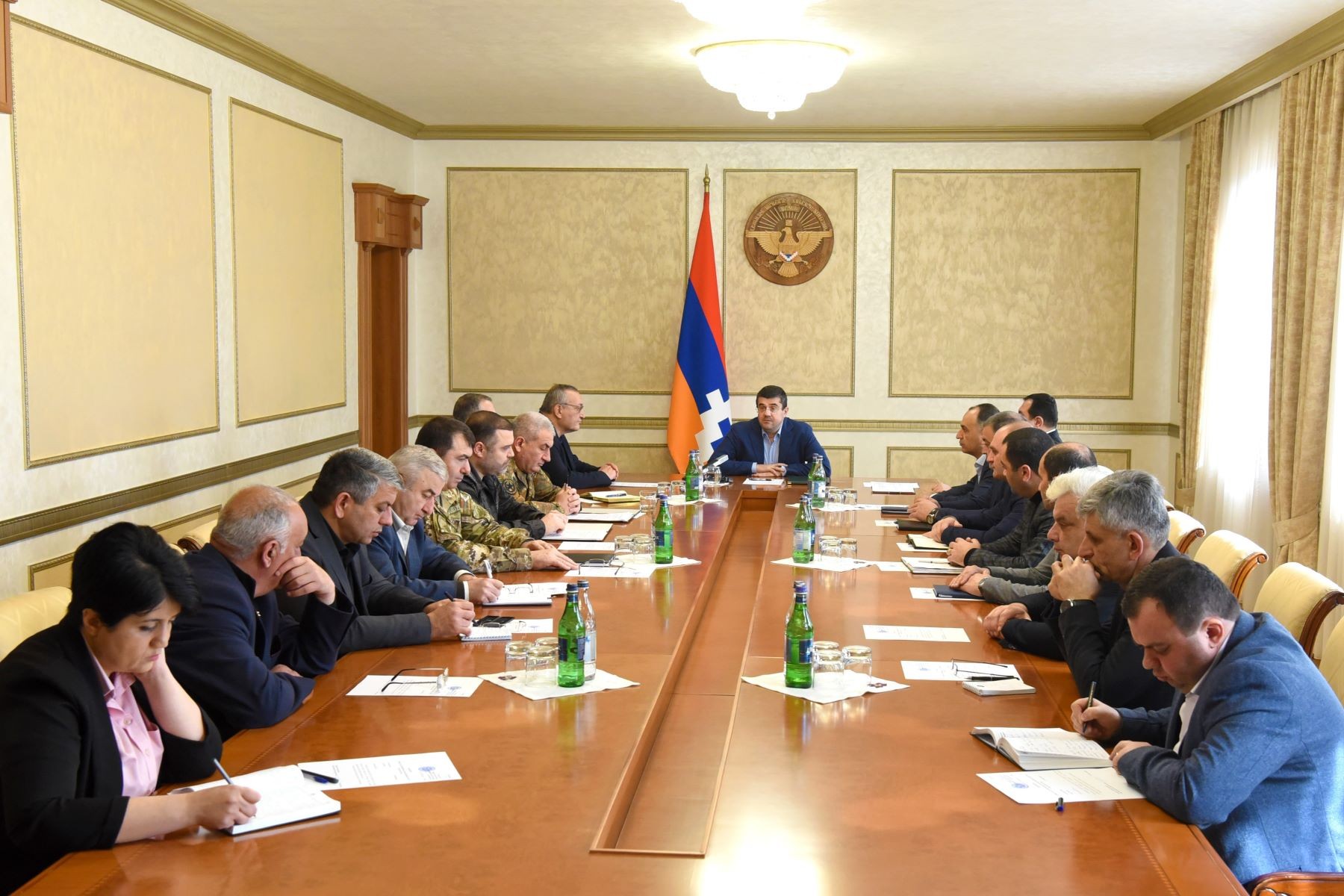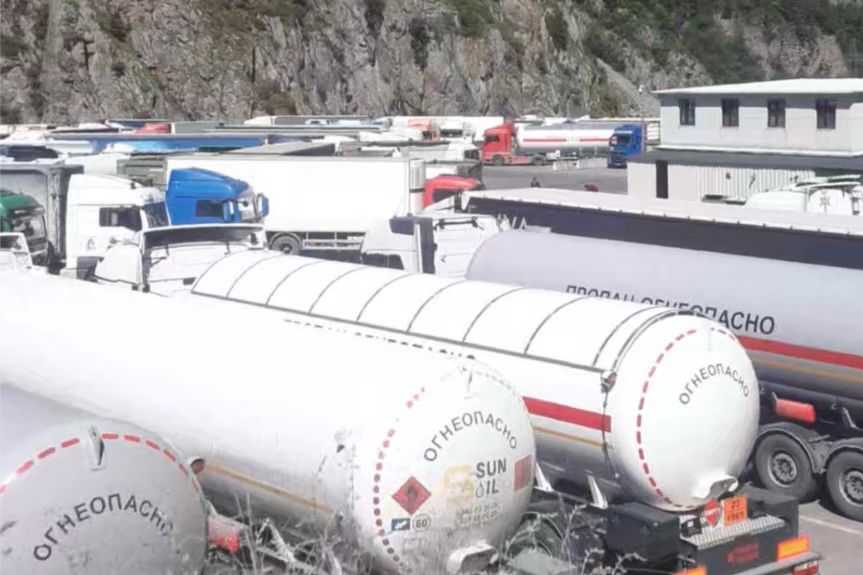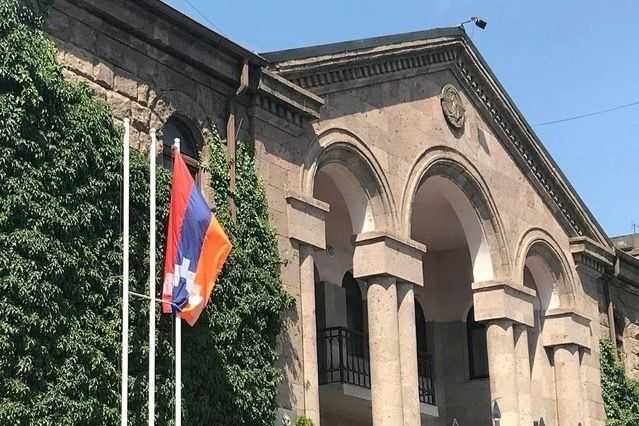
Nagorno-Karabakh’s President, Arayik Harutyunyan, said on Monday that Azerbaijan had threatened ‘tougher and more drastic steps’ if Nagorno-Karabakh did not agree to integration with Azerbaijan.
This comes as Nagorno-Karabakh approaches the end of its third month under blockade, after Azerbaijani protesters obstructed the Lachin Corridor in December.
Over the past months, the region’s electricity and gas supply, which passes through Azerbaijan-controlled territories, has also been repeatedly disrupted.
Speaking at Monday’s meeting of Nagorno-Karabakh’s Security Council, Harutyunyan said that they had refused Baku’s demands for the region to ‘integrate’ with Azerbaijan.
Azerbaijan considers Nagorno-Karabakh to be territory of Azerbaijan temporarily under the control of Russian peacekeeping forces, while Armenia and Nagorno-Karabakh claim that Azerbaijan is attempting to effect a ‘genocide’ of Nagorno-Karabakh’s Armenian population.
‘We did not accept [and] do not accept, and today I want to state again that it is not only a decision of the Security Council, but the overwhelming majority of our people accept that we will not deviate from our right to independence and self-determination’, said Harutyunyan. ‘And that means that in the near future, we will have various developments, situations that we will have to face.’
The Security Council meeting came a day after the death of three Nagorno-Karabakh police officers and two Azerbaijani soldiers in Nagorno-Karabakh.
[Read more: Five killed in clash in Nagorno-Karabakh]
Azerbaijani authorities claimed to have received information that a vehicle was transporting ammunition from Armenia, and stated that the police officers on board opened fire in response to demands to stop for inspection. Stepanakert maintains that the minibus that came under fire was on a regular police patrol.
On Tuesday, Azerbaijan’s Defence Ministry said another ‘convoy’ along the road had been spotted, this time escorted by Russian peacekeepers. They called this is ‘unacceptable’ and a ‘gross violation’ of the 2020 ceasefire agreement.
Following the incident, the Azerbaijani authorities repeated their demand that Azerbaijani checkpoints be installed on the Lachin Corridor, which connects Nagorno-Karabakh to Armenia. Both Yerevan and Stepanakert have repeatedly and firmly rejected such offers.
Armenia’s Foreign Ministry spokesperson told RFE/RL that Armenia’s position on the matter of checkpoints had not changed since last week’s attack, which Yerevan described as an act of terrorism.
In a visit to Baku in late February, Russian Foreign Minister Sergey Lavrov stated that establishing checkpoints on the corridor, which according to the 2020 ceasefire agreement should be controlled by Russian peacekeepers, was ‘not envisaged’.
‘But it is possible to dispel, by technical means, suspicions that the corridor is not functioning as intended’, added the minister.
Accusations and denials
The announcement also followed two meetings between representatives of Nagorno-Karabakh and Azerbaijan in late February and early March, the only such meetings to have taken place since the region’s blockade began on 12 December.
President Harutyunyan said that Azerbaijan had expressed its ultimatum through ‘its channels’ following the meetings, stating that there would be ‘no solution to the current issues’ if Stepanakert did not agree to integration.
The Nagorno-Karabakh authorities stated that the meetings did not concern the region’s political status, instead focusing on ‘technical issues’: the opening of the Lachin Corridor, restoration of the electricity supply from Armenia to Nagorno-Karabakh, restoration of the region’s gas supply, and resuming mining operations in Nagorno-Karabakh.
Harutyunyan noted that during the second meeting, an Azerbaijani representative had raised the issue of integration, but was met with objection from his Nagorno-Karabakh counterparts.
‘We have two options: either we have to continue the struggle, or if there are people in the public who think that the proposal put forward by Azerbaijan should be accepted, people can speak about their civil rights. They have the right to say that we have not chosen the right path, to formalise their statements, and to establish a new government in the country’, Harutyunyan said.
The spokesperson for Azerbaijan’s Foreign Ministry, Aykhan Hajizadeh, told Meydan TV that Azerbaijan ‘did not threaten the Armenian community living in Nagorno-Karabakh’.
On Monday, Azerbaijan’s Defence Ministry also stated that ‘Armenian troops should be completely withdrawn from the territory of Azerbaijan’ and repeated accusations that Armenia was laying mines in Nagorno-Karabakh.
No Armenian troops are officially stationed in Nagorno-Karabakh, and the UN’s International Court of Justice in February rejected a request from Baku to order Armenia to stop planting landmines in ‘areas to which Azerbaijani civilians will return in Azerbaijan’s territory’.
The statement continued by saying that, if the demands stated were not met, Azerbaijan would be ‘forced to take absolutely necessary measures using all possibilities to disarm and neutralise illegal armed forces’.
For ease of reading, we choose not to use qualifiers such as ‘de facto’, ‘unrecognised’, or ‘partially recognised’ when discussing institutions or political positions within Abkhazia, Nagorno-Karabakh, and South Ossetia. This does not imply a position on their status.






